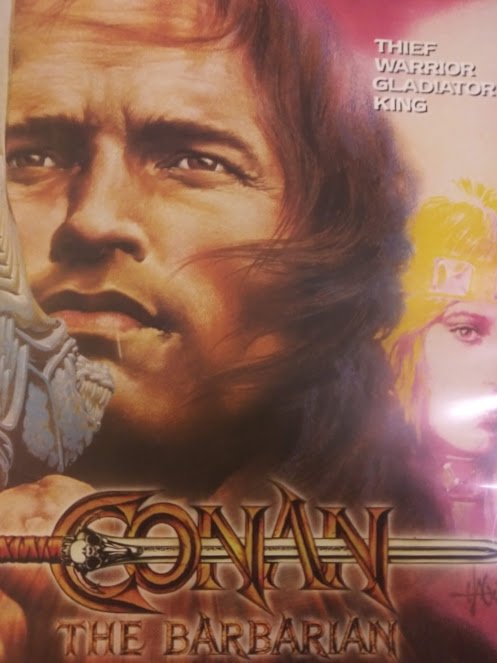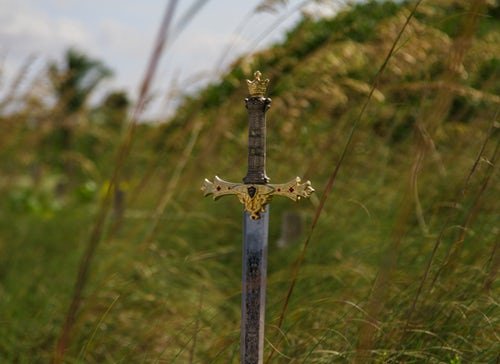Finding Philosophy in Unlikely Places: "The Riddle of Steel" and What it Says About Self-Reliance
I was watching one of my favorite films today and I noticed something that really caught my eye. There was a philosophical message that I have never payed attention to that has, somehow, also colored my worldview throughout my entire life (I watched the film for the first time as a young child). The interesting thing is, the movie that may have been responsible for laying some of the foundation for my own personal philosophy was not what one would expect. This is not an art film, it is not a movie that most would call deep (though I would disagree). To stop beating around the bush, the movie is Conan the Barbarian (1982). If you have seen it, you may be thinking that I have completely lost my mind. It was a borderline "B" movie in its own time and it hasn't aged particularly well (not poorly either but it definitely looks like something from the early 1980's). That stuff doesn't matter though, in addition to being well directed, written, and acted it also contains a message (I would dare to say "truth") that I know is important to my own life and I believe would be worth hearing out for others. That being the case, I want to take a look at the viewpoint that is presented in the film and discuss why it should and how it could be applied in the real world.
I don't want to make this a post about the film (not directly, anyway). I actually already wrote a review of Conan the Barbarian back when I still wrote movie reviews so writing another one would be redundant. However, to help make my case here, I should provide a brief description for those of you who may not have seen it. The movie follows Conan, who was sold into slavery as a child. He is trained as a pit fighter and is eventually released by the master who has grown to respect (or perhaps, love) him. He goes on a quest for revenge against the man who killed his family and slaughtered his village. He believes in Crom the mountain god. Several companions join Conan on his quest and they ultimately succeed but only at great personal cost.

Very early in the movie, Conan's father sits with him atop a mountain and speaks about "the riddle of steel." At the end of his speech, he points to his sword as his young son gazes at him and says the following "For no one, no one in this world can you trust, not men, not women, not beasts. This, you can trust." I don't take this literally, although that argument could be made. Instead, I see the sword as a symbol for the self. The lesson here is that we cannot rely on others and that we must look to ourselves, our own strengths, our "steel" because others can let us down. No matter what, our "swords" will be there when we need them and they will always do what we ask of them (because we are the ones wielding them).
Near the end of the movie, Conan prepares for an upcoming battle and prays to Crom for the first time: "No one, not even you, will remember if we were good men or bad, why we fought or why we died. [...] All that matters is that two stood against many. That's what's important. [...] So grant me one request. Grant me revenge and if you do not listen, then to hell with you." I included the bulk of the prayer because it isn't a bad speech but I really want to focus on the last sentence. Therein, Conan essentially tells this god, whom he believes in, that "if you don't help, I have no use for you." This is another scene in which the message seems to suggest that one must be ready to count on the self. Even the gods can let you down but you can always fall back on your own might when you stand "against many."

To put it simply, "the riddle of steel" scene and Conan's prayer are about self-reliance and I believe that this is a positive trait to cultivate. This isn't to say that one shouldn't accept help from people if they are willing to give it. However, whenever one puts his or her trust into something, he or she takes the risk of being let down by that thing. We cannot control what others will do. Loyalty and dependability cannot be regulated or demanded. The world keeps on moving without any regard for our wishes and desires. The gods may not exist or they may not care to listen to our cry's if they do. The only thing we have agency over is the self. Realizing this allows us to prepare to rely on ourselves if the need should arise.

This preparedness is a relatively simple thing to achieve. We can still function normally in the world. We can still let others do things for us. You can still pray to whichever god that you believe in. However, it is important to have a contingency plan that doesn't require the aid of others. It is helpful to be ready to be let down and have ways of dealing with it. Doing this may mean success where one who doesn't trust in his or her "sword" would have failed. Even if one tries to stand on his or her own and falls, he or she can still rest assured that he or she did everything in his or her power in the attempt.
Is it silly to take life lessons from 1980's fantasy films? Maybe but when I look back on the figures, the characters, and the stories that have affected me, they are not usually not works of high art, or renowned intellectuals, or well studies "heroes" but their messages, I think, are what matters and sometimes one can find good philosophy in these unlikely places.
Peace.
I didn't want to provide links to the relevant scenes in the movie because they are copyrighted but if you care to see them, you can search "the riddle of steel" and "Conan's prayer to Crom" on YouTube and they come right up.
The quotations are taken, obviously, from the 1981 film Conan the Barbarian.
With the exception of the picture of the DVD case (which is my own), all the other images in this post are sourced from the free image website, unsplash.com

When I read the title of the movie I had a smile of nostalgia :)
Rely only on ourselves this means taking responsibility for our actions and not looking for someone guilty for what is happening to us.
I remembered the phrase of Don Juan from the books of Castaneda: A warrior has nothing in the world except his impeccability, and impeccability cannot be threatened.
Congratulations for Curie upvote! :)
"not looking for someone guilty for what is happening to us." I agree. It is easy to put blame on others so a lot of people will try without ever looking to themselves.
Conan is great, congratulations on another Curie upvote!
"Valor pleases you, Crom... so grant me one request. Grant me revenge! And if you do not listen, then the HELL with you!" One of my favorites too.
Thanks.
Yeah it is a great scene. If I were to write a detailed critical work about the movie (something akin to a college paper), I might make it about how the film functions as a very rare example of an atheist fantasy (the other examples I would point to are the novels that Game of Thrones is based on but not the show itself). That is Crom never really helps Conan because the gods are not real. The other way one could go with it is that the movie is a right wing propaganda film. It follows pretty well given that it is a John Milius film. In that case, one could see the riddle of steel as a pro-gun message but I don't necessarily take that position lol.
I forgot to mention, I watched Conan in the theater when it first came out. I really don't remember why. I didn't know the story, I didn't really know anything about it, but I liked the prehistorical settings and the libertarian aspects of it all. I don't know if it ages well, but it was good movie that his stuck with me through the years. Much like the early Clint Eastwood spaghetti westerns. A fresh breeze was brought in a multimedia format by such "new" attempts to mix the motifs.
"Maybe but when I look back on the figures, the characters, and the stories that have affected me, they are not usually not works of high art, or renowned intellectuals, or well studies 'heroes' but their messages, I think, are what matters and sometimes one can find good philosophy in these unlikely places."
I agree. The stream I still cannot resist is the old LA comedy team Firesign Theater. One of my favorites was: "Everything You Know Is Wrong." I know they were most popular for "Nick Danger," which was very good, but I have a tendency to go back to the shadows of the early '70s Firesign rather than the late 60's. "We Are All Bozos on This Bus" from '71 is very nice. They were a very big influence on Standup comics like Bill Hicks. I really miss him.
Nice. For me I think it was Carlin that provoked a lot of thought. Then I got into a lot of the Alt-Comedians who got big in the 90's. A bunch of them have kind of fizzled out but I still enjoy David Cross and Doug Stanhope quite a bit.
This post has been upvoted and picked by Daily Picked #54! Thank you for the cool and quality content. Keep going!
Don’t forget I’m not a robot. I explore, read, upvote and share manually 😊
You can upvote, follow, resteem, delegate and join my curation trail to support me, good creators and minnows.
Thank you!
Thank you.
Hi artisticscreech,
Visit curiesteem.com or join the Curie Discord community to learn more.
@artisticscreech Thank you for not using bidbots on this post and also using the #nobidbot tag!